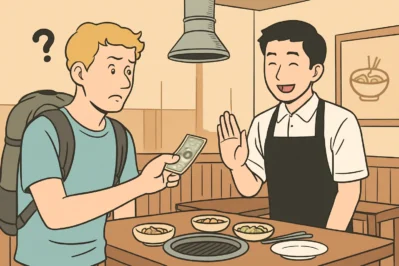To Tip or Not to Tip? Your Guide to Korean Tipping Culture
Hello! This is [Daily Korean], here to upgrade your Korean skills!
Have you ever stood awkwardly at a restaurant counter, wondering if you should leave a tip? It can be a real culture shock moment for travelers! Today, we’re going to solve that puzzle. We’ll dive into Korea’s tipping culture so you can dine and travel with confidence. Recently, with more and more international visitors, this topic has become a frequent point of conversation in Korea. Let’s learn how to handle it like a pro!
Core Expressions You Need to Know
Here are some essential phrases to help you navigate paying for services in Korea.
1. 팁 (Tip)
* Pronunciation: [Tip]
* English Meaning: Tip
* Detailed Explanation: This is a direct loanword from English. While Koreans know the word “팁,” the act of tipping is not a part of the culture. In 99% of situations (restaurants, taxis, hair salons), a tip is not expected or required. Good service is considered part of the price you already paid.
2. 계산서 주세요. (Gyesanseo juseyo.)
* Pronunciation: [Gye-san-seo ju-se-yo]
* English Meaning: “Check, please.” / “Bill, please.”
* Detailed Explanation: This is the standard, polite phrase to use when you’re ready to pay at a restaurant. Remember, the amount on the “계산서” is the final amount. There’s no need to calculate an extra 15-20% for a tip.
3. 괜찮아요, 팁은 필요 없어요. (Gwaenchanayo, tibeun piryo eopseoyo.)
* Pronunciation: [Gwaen-cha-na-yo, ti-beun pi-ryo eop-seo-yo]
* English Meaning: “It’s okay, no tip is necessary.”
* Detailed Explanation: Don’t be surprised if you hear this! If you try to leave a tip out of habit, a kind employee might say this to you. They are not being rude; they are politely explaining the cultural norm and trying to save you money. It’s a friendly gesture.
4. 잘 먹었습니다! (Jal meogeotseumnida!)
* Pronunciation: [Jal meo-geot-seum-ni-da]
* English Meaning: “I ate well!” / “Thank you for the meal!”
* Detailed Explanation: This is the best way to show your appreciation instead of a monetary tip. Saying this to the staff or owner as you leave is a warm and common courtesy that expresses your satisfaction with the food and service. It’s much more culturally appropriate than leaving cash on the table.
Example Dialogue
Let’s see how these phrases work in a real-life situation. Imagine two friends, A (a Korean) and B (a foreigner), at a popular dak-galbi (spicy stir-fried chicken) restaurant in Seoul.
A: 와, 진짜 맛있다! 배부르다.
(Wa, jinjja masitda! Baebureuda.)
(Wow, this is so good! I’m full.)
B: I agree! The service was great, too. Excuse me! 계산서 주세요.
(Excuse me! Check, please.)
(The waiter brings the bill.)
B: (Takes out extra cash) The total is 40,000 won. I’ll leave 45,000 won. The extra 5,000 is a 팁.
(The extra 5,000 is a tip.)
A: 아, 아니야! 괜찮아요, 팁은 필요 없어요. 한국에서는 팁 안 줘도 돼.
(A, aniya! Gwaenchanayo, tibeun piryo eopseoyo. Han-guk-eseoneun tip an jwodo dwae.)
(Oh, no! It’s okay, a tip isn’t necessary. You don’t have to tip in Korea.)
B: Really? Oh, I didn’t know. Okay then.
(As they leave the restaurant, B says to the owner.)
B: 잘 먹었습니다!
(I ate well!)
Culture Tip & Trend Deep Dive
So why is there no tipping culture? In Korea, the belief is that the price of the food or service already includes the cost of excellent service. It’s built into the business model. Employees are paid a set salary and don’t rely on tips to make a living wage.
A Modern Twist: Recently, in very tourist-heavy areas like Itaewon or Myeong-dong, you might spot a small “tip jar” next to the cash register in some trendy cafes. This is a new phenomenon influenced by international culture. However, even for young Koreans (the Z generation), this is still a bit unusual. Most Koreans will simply ignore the jar. So, if you see one, don’t feel pressured! It’s completely optional and not at all expected.
The best “tip” you can give is a sincere compliment. A warm “감사합니다 (Gamsahamnida – Thank you)” and “잘 먹었습니다 (Jal meogeotseumnida)” will make the staff’s day more than a few extra bills ever could.
Let’s Review & Practice!
Great job today! We learned that tipping isn’t customary in Korea and picked up some key phrases for a smooth dining experience. Now, let’s test your knowledge!
1. Fill in the blank:
You’ve finished a delicious meal and want to pay. You signal the waiter and say: “저기요, __________ 주세요.” (Jeogiyo, __________ juseyo.)
2. O/X Quiz:
In Korea, it’s considered polite and necessary to leave a 15% tip at all restaurants. (O / X)
You’ve got this! Try answering the questions in the comments below. Also, share your experiences with tipping culture in other countries! We’d love to hear your stories.






